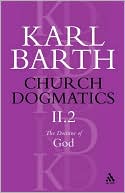

 |

|

The average rating for Church Dogmatics - Volume II, Part 2: The Doctrine of God based on 2 reviews is 5 stars.
Review # 1 was written on 2017-02-08 00:00:00 Michael Collins Michael CollinsAt long last. A masterpiece, whose reputation and influence are deserved. As ever in finishing part-volumes of the Dogmatics, I felt breathless by the end of the last page. Further up and further in. |
Review # 2 was written on 2020-11-29 00:00:00 Morris Moton Morris MotonKarl Barth rounds out his exposition of the doctrine of God under two heads: the election of God and the command of God. In his first self-consciously significant break with John Calvin, Barth here unfolds his highly idiosyncratic doctrine of election. In his view, although the Reformers did much to rescue the doctrine of sovereign election from a Roman Catholic neo-Pelagianism, they failed to recognize that election is more primal than an arbitrary selection of individuals for salvation and a corresponding rejection of others to damnation. Rather, Jesus Christ himself, the second person of the eternal triune Godhead, is the original and proper object of the Father's election. He is chosen before time to be the original Elect Man, and he also is chosen before time to be the original Rejected Man. As he bears the Father's rejection to damnation, so he receives the Father's redemptive election to salvation. We have no part or parcel in this two-fold work accomplished on our behalf, and solely by the Father's good pleasure, before time and in time. Our role in salvation is either through repentant faith to embrace the Son's election as our own through his work on the cross, or to embrace his rejection as our own in a stubborn insistence on our individual sovereignty. In reality, this is an impossible and impotent choice since Christ has already borne that rejection fully; it is not ours to choose. This is a choice that leaves us in Satan's powerless shadow kingdom, a choice that leads nowhere but to the eternal destruction which awaits all that exists in the impossible unreality outside of Christ's dual role as Elected and Rejected Man. Again, this is certainly an idiosyncratic view of election. To me, it seems to flirt with the edges of universalism. If we all in some sense exist in a state of election that we have only to accept in repentant humility or (impossibly) to reject in stubborn pride, could one argue that the very impossibility of choosing a rejection that Christ has already fully borne might ultimately lead to universal salvation? Barth himself refers frequently enough to the notion of eternal destruction that he seems still to be within the guardrails, but it would be helpful to get a better grasp of what he means when he speaks of eternal destruction. Perhaps he gets to that later in the series; this is, after all, a twelve-volume theology. The second head, that of God's command, is concerned with Christian ethics. Here Barth helpfully grounds ethics in the acts of God himself. As God has met and meets us with boundless compassion through his son Jesus Christ, so too we are to meet with others on that same basis of boundless compassion regardless of their disposition toward us or toward God. Here again, though, Barth's idiosyncrasies surface in his insistence that revelation is inherently an historical act of God toward specific individuals in concrete and unrepeatable situations. Revelation can only be attested in the pages of Scripture, not repeated over and over again as general rules for us to interpret and apply in our situations by our own lights (i.e., no Scripture is a matter of one's own interpretation). The Bible, therefore, in passages such as the Ten Commandments and the Sermon on the Mount, does not constitute a rulebook for life so much as it indicates the outer boundaries within which our response to God's command, our execution of Christian ethics, must take place as we respond to that concrete command of God in our own specific historical circumstances. I appreciate Barth's emphasis on constant and fervent prayer as the means by which, in communication with the Word of God through the Bible, we live in vigilant attendance on God's commands for us from day to day. The urge to prayer is both salutary and welcome. I am less clear on what exactly to do with this on a day-to-day basis, or how I'm supposed to distinguish God's command from my own baptized feelings. I'm not certain Barth manages to extricate himself from the charge he elsewhere lays against Pietism for being too mystical, since the decoupling of the command of God from the specific written commands of Scripture seems to leave the door ajar for the very mysticism Barth otherwise decries. Still, there are a lot of tough nuts to crack in the question of how exactly to apply Scripture when so much of it has no obvious translation into a modern context (e.g., what to do with slaves captured in regional wars). Whether or not Barth's contribution to this conversation ultimately makes any sense in terms of daily Christian living, he raises good questions and provides thoughtful answers that certainly give the thoughtful reader much to chew on. |
CAN'T FIND WHAT YOU'RE LOOKING FOR? CLICK HERE!!!